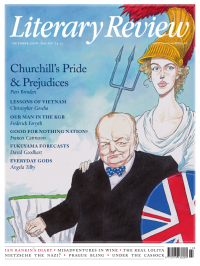Matt Rowland Hill
Tongue Twister
Berta Isla
By Javier Marías (Translated by Margaret Jull Costa)
Hamish Hamilton 531pp £18.99
What is the cost of keeping a secret from someone you love? In Berta Isla, a novel by the celebrated Spanish author Javier Marías, a couple’s minor disloyalties – which they justify as mere ‘parentheses’ or emergency measures in their relationship – breed further betrayals until they find their lives ‘swathed in mist and mystery’. When does an extended parenthesis overwhelm the sentence in which it occurs? How long can you lead a parallel life before it supplants your real one? At what point does a state of emergency become, simply, the law? These questions all bear upon the action of this guileful and beguiling tale. Like its characters, Berta Isla is a shape-shifter: part spy thriller, part murder mystery, part cerebral caper with echoes of Melville, T S Eliot and Henry V. It is also a trans-European historical novel, set between Oxford and Madrid in the 1970s and 1980s, with a hinterland that includes the campaigns of ETA and the IRA, the fall of Franco, the rise of Thatcher and the Falklands War.
But at its centre is an anxious, brooding domestic drama. Classmates Berta Isla and Tomás Nevinson are not yet fifteen when they fall in love, knowing at once ‘that theirs was a serious relationship and not a brief flirtation that would end along with the term’. Berta, a ‘dark-haired

Sign Up to our newsletter
Receive free articles, highlights from the archive, news, details of prizes, and much more.@Lit_Review
Follow Literary Review on Twitter
Twitter Feed
Literary Review is seeking an editorial intern.
Though Jean-Michel Basquiat was a sensation in his lifetime, it was thirty years after his death that one of his pieces fetched a record price of $110.5 million.
Stephen Smith explores the artist's starry afterlife.
Stephen Smith - Paint Fast, Die Young
Stephen Smith: Paint Fast, Die Young - Jean-Michel Basquiat: The Making of an Icon by Doug Woodham
literaryreview.co.uk
15th-century news transmission was a slow business, reliant on horses and ships. As the centuries passed, though, mass newspapers and faster transport sped things up.
John Adamson examines how this evolution changed Europe.
John Adamson - Hold the Front Page
John Adamson: Hold the Front Page - The Great Exchange: Making the News in Early Modern Europe by Joad Raymond Wren
literaryreview.co.uk